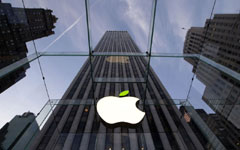Spokespeople for Apple, Google and Intel declined to comment. An Adobe representative said that the company denies it engaged in any wrongdoing, but settled "in order to avoid the uncertainties, cost and distraction of litigation." An attorney for the plaintiffs, Kelly Dermody of Lieff Cabraser Heimann & Bernstein, in a statement called the deal "an excellent resolution."
Corporate defendants in antitrust cases often agree among themselves what portion each will contribute towards a settlement, said Daniel Crane, a professor at the University of Michigan Law School. One likely formula would be to divide the damages based on how many employees each company has in the class, he said.
|
 |
Walt Disney Co's Pixar and Lucas film units and Intuit Inc had already agreed to a settlement, with Disney paying about $9 million and Intuit paying $11 million.
Any settlement must be approved by US District Judge Lucy Koh in San Jose, California. A hearing on final approval of the Intuit and Disney deals is scheduled for next week.
The plaintiffs and the companies will disclose principal terms of the settlement by May 27, according to the court filing on Thursday, though it is unclear whether that will spell out what each company will pay.
Some Silicon Valley companies refused to enter into no-hire agreements. Facebook Chief Operating Officer Sheryl Sandberg, for instance, rebuffed an entreaty from Google in 2008 that they refrain from poaching each other's employees.
Additionally, Apple's Jobs threatened Palm with a patent lawsuit if Palm didn't agree to stop soliciting Apple employees. However, then Palm Chief Executive Edward Colligan told Jobs that the plan was "likely illegal," and that Palm was not "intimidated" by the threat.
The case in US District Court, Northern District of California is In Re: High-Tech Employee Antitrust Litigation, 11-cv-2509.
